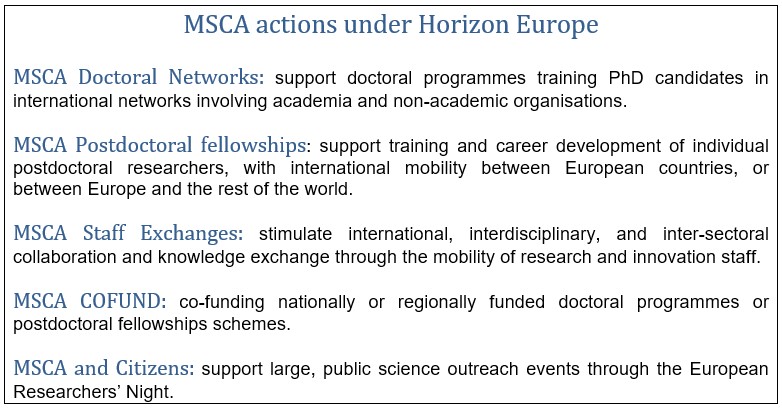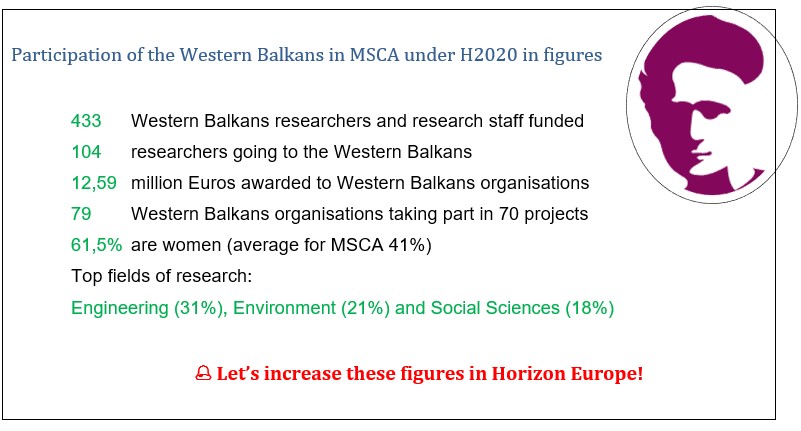[Focus Article] - The Marie Skłodowska-Curie actions under Horizon Europe. Continuing research and training opportunities
The preparation of the MSCA under the new framework programme for research and innovation for the period 2021-2027, Horizon Europe, is in its final stages. The budget for MSCA under Horizon Europe is planned to reach EUR 6.6 bn, slightly increasing compared to Horizon 2020. MSCA is one of the main components of Horizon Europe’s Pillar I ‘Excellence Science’. Since the MSCA have a certified excellent reputation, the new programme will, in line with stakeholders’ suggestions, offer continuity and introduce only a relatively small number of improvements, adjustments and further simplifications in terms of programme structure, rules and definitions. It will continue to focus on its international component and will reinforce its intersectoral and interdisciplinary collaboration aspects.
Among the proposed changes:
- Simplifying the name of the actions and reducing the number of sub-actions to facilitate participation
- Introducing measures to tackle oversubscription (currently e.g. 8% success rate for applicants in doctoral programmes),
- Enhancing synergies with other EU programmes
- and strengthening outreach activities for citizens.
While keeping their bottom-up nature, the MSCA will further contribute to other broad EU policies such as the Green Deal. There will be new incentives to expose more fellows to the non-academic sector.

EU missions are an integral part of the Horizon Europe framework programme beginning in 2021. They consist in commitments to solve some of the greatest challenges facing our world like fighting cancer, adapting to climate change, protecting our oceans, living in greener cities and ensuring soil health and food.
The EU can build on the strengths of the community of MSCA researchers participating in doctoral programmes, postdoctoral fellowships and collaborative staff exchanges to test ideas, organise dialogues with policymakers, engage citizens and take the lead in developing breakthrough solutions relevant for the different Missions.
The Commission has started to regularly organise thematic clusters of MSCA researchers working on similar research topics to give them the opportunity to present and share the result of their research work with sectoral DGs and discuss how they can contribute to their expert and legislative work. The last one was organised on 18-19 March 2021, on the topic of Cancer. More meetings are foreseen in the future notably one on the Green Deal (date to be confirmed).
We will also contribute to citizens’ engagement for the Missions through the mobilisation of our networks and platforms like the Marie Curie Alumni Association, or events like the European Researchers’ Night or Science is Wonderful!, the science exhibition bringing every year the world of science to the public.

Since 2014, Albania, Bosnia and Herzegovina, North Macedonia, Montenegro and Serbia participate in Horizon 2020 as Associated Countries. Therefore, they can take part in the MSCA under the same conditions as EU Member States. As Kosovo* is not part of Horizon 2020 it participates in the MSCA as a Third Country.

* This designation is without prejudice to positions on status, and is in line with UNSCR 1244/1999 and the ICJ Opinion on the Kosovo declaration of independence.
“I experienced outstanding conditions for my personal and professional development. Apart from generous funds to fulfil my research tasks, I received a great training, including the access to a collaboration network, research stay in both clinical and industrial sectors, and many opportunities to share my research with the scientific community. I am sure that this valuable experience significantly increases my chances in further career improvement.” Marina (ITN fellow).
"MSCA fellowship is a great way to experience international mobility within the safe environment MSCA provides. It enables researchers to develop own projects with the team of their own choosing, at the same time becoming a lifetime part of a big and influential MSCA network."
Kata (COFUND fellow)
MSCA National Contact Points (MSCA NCPs):
All Western Balkan countries have appointed National Contact Points for the programme, which provide guidance, practical information and assistance on all aspects of participation in the programme to organisations, stakeholders and potential applicants.
https://ec.europa.eu/info/funding-tenders/opportunities/portal/screen/support/ncp
Net4Mobility+ project:
The “Net4MobilityPlus” project facilitates the trans-national cooperation between National Contact Points for the MSCA with a view to identifying and sharing good practices and raising the general standard of support to applicants. The material developed within the project also benefit the scientific community at large. You can find on their website useful information such as information on calls, guidelines for applicants, presentations, access to webinars, success stories as well as statistics on calls.
- MSCA Website
- Social media:
- Facebook: @Marie.Curie.Actions
- Twitter: @MSCActions
- Others :
- Marie Curie Alumni Association (MCAA)
- Euraxess : Find a job in research, including MSCA positions
- Net4Mobility+ project (MSCA NCP project)
____
For more dedicated articles, please visit the WBC-RTI.INFO theme section here
- Other
English
2021
- Western Balkans
- General
Entry created by Admin WBC-RTI.info on April 29, 2021
Modified on April 29, 2021
